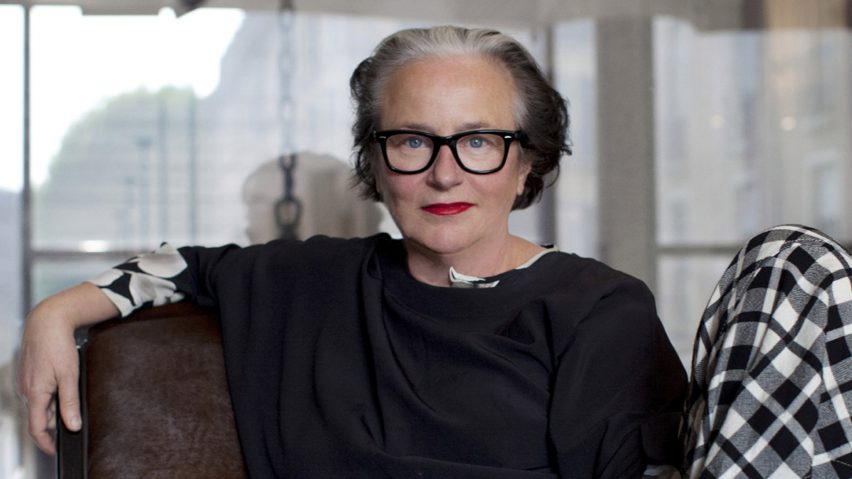Two days before Covid-19 was declared a pandemic last year, trend forecaster Li Edelkoort predicted it would lead to a quarantine of consumption in an interview with Dezeen. In the third part of our series marking the anniversary of the pandemic, she discusses how it has changed the world.
In the 2020 interview, which later became Dezeen's most-read story of all time, Edelkoort predicted that coronavirus would lead to "a global recession of a magnitude that has not been experienced before."
"It seems we are massively entering a quarantine of consumption where we will learn how to be happy just with a simple dress, rediscovering old favourites we own, reading a forgotten book and cooking up a storm to make life beautiful," she said.
Climate change "a more deadly challenge"
Speaking to Dezeen this week, she said that after coronavirus, the world will have to deal with the even bigger threat that is climate change.
"After this pandemic, we will fully engage with the next one which is climate change," she said. "Possibly a more deadly and devastating challenge."
"It seems that awareness has grown immensely on all levels, private, public and corporate," said Edelkoort, who runs New York City forecasting agency Edelkoort Inc.
"To witness nature take its course has inspired everybody and health and wellbeing have become important issues on a larger scale."
"Architecture will focus on sustainable systems"
Edelkoort believes that this focus will lead to cities becoming greener places informed by the ideals of the 19th century Arts and Crafts designer William Morris.
"The focus will be on sustainable housing with an Arts & Crafts core to its finishes and design that is more decorative and more cosy," she said. "Of course, the kitchen is the number one room to demand concentration, while bedrooms are becoming junior suites with a royal shower, a walk-in closet, small furniture and writing desk."
"Architecture will focus on sustainable systems, tiny houses, cabins and huts as well as rethinking empty urban buildings to help the greening and re-setting of the city," she added.
"Thus the country becomes farmer gentrified and the city a greener pasture, exchanging roles before melting into one garden state with clusters of housing and buildings, entering the realm of utopia according to William Morris."
There will be a new focus on colour, pattern and shape, she predicted, to create "more engaging and personal interiors". "We all have learned how important simple and beautiful objects can be during lockdown," she said. "They are not life-saving but they are essential somehow."
"People are leaving cities in hordes"
Edelkoort has also observed how people moving en-masse from the cities to the countryside to take advantage of lower house and land prices. "The real estate markets have rarely been as agitated and perplexing as they are today," she said.
"Country houses are bought over the phone, even without visiting. In many countries, people are leaving cities in hordes to settle in more affordable and more beautiful homes with gardens close to nature, or in smaller city centres," she continued.
The trend forecaster expects this movement to continue as people are freed from office life.
"Young people are snapping up country cottages and barns, fisherman's houses and labour dwellings to make a home in tiny spaces," she said. "It is insane to realise that one can buy a house for 20,000 euros, with a lot of land as well."
"Architecture and design, as well as DIY activities, will thrive," she added, pointing out that "crazy numbers" of people were spending money on home improvements.
"The idea of work hotels comes to mind"
Technology has allowed people to become more nomadic, she said. "Wifi has paved the way to the liberation of dedicated space, we can also choose to live as nomads and in wonderful camping vehicles."
In turn, this will lead companies to rethink how they create workspaces for this new generation of mobile workers.
"The work-from-home movement will not stop but continue as another way to be, setting people free from a location," she predicted, "inciting companies to create new hubs where we can gather to work (and sleep?) together and then go home again. The idea of work hotels comes to mind."
Dezeen interview made Edelkoort "an activist for change"
Edelkoort's interview with Dezeen last year, which became Dezeen's most-read story of all time, led her to establish a forum for discussing the future of the planet.
"The famous Dezeen interview has moved me to become an activist for change and I have been compelled to start the World Hope Forum with my colleague Philip Fimmano to inspire creative people to take the lead and decide on our future together, taking care of people and the planet," she explained.
On a personal level, Edelkoort said the pandemic has given her "peace of mind".
"The virus has given me peace of mind and rest of body, replenishing me with interesting work and totally new questions, with many new connections all over the world, with work on distance with designers and architects I haven't even met in real-time… the global village has become my place," she added.
"Food is even more crucial than before"
"It has shown me how friendships and relationships work (or stop working), how living as a micro-hedonist has made my existence more valued, how great clothes can be to help me be, and how food is even more crucial than before."
"Decades of flying around the planet have taught me how to concentrate in loneliness and I guess this is the reason that to be alone most of the time has been healing and rewarding," she concluded.
"The only things I miss are flirting, dancing and cuddling."
Today marks one year since the World Health Organisation officially declared coronavirus a global pandemic. To mark the anniversary, Dezeen spoke to twenty of the world's leading designers including Norman Foster, Virgil Abloh, Kelly Hoppen and Sevil Peach, about the impact of the virus.

